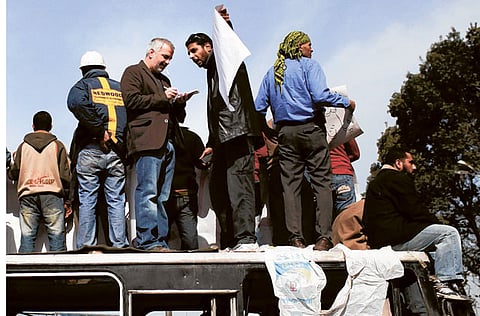‘Home is everything'
Tirelessly reporting from the Middle East, Anthony Shadid sought to reunite with his people

Anthony Shadid "returned home" to his ancestors' land as the renowned correspondent for The Washington Post and, after 2009, for The New York Times. Over the years, what distinguished his reporting was a heartfelt concern for the Arab world's humanity and enduring civilisation, something that others chose to overlook as they recounted blood and gore.
In the aftermath of 9/11, which coloured what was easy to caricature, Shadid illuminated with empathy, almost always asking the vital questions rather than being consumed by the hatred that passed for journalism in too many outlets. Above all else, he stood out among his peers for managing to do the nearly impossible — write about Arabs and Muslims in ways that were not insulting and, in the process, earned not one but two Pulitzer prizes for his coverage of the war for Iraq (2004 and 2010). In short, though an Oklahoma City native, Shadid was a proud Lebanese.
House of Stone is a solid memoir of what the "father" endured as he restored his great-grandfather's home in the southern Lebanese town of Marjayun. Though it may be possible to read a variety of motives for writing this book, including a cathartic desire to cleanse oneself of too many years on the road away from wife and child, Shadid's narrative covers parallel stories.
To be sure, there is the undertaking to deal with his experiences as a correspondent "stunned by war, and, shockingly, no longer young, or married, or with my daughter, Laila" (page 15). Shadid remarried; his second wife was Nada Bakri, a reporter for The New York Times, with whom he has a son, Malik.
Yet, and equally important, was the young man's attempt to rehabilitate his ancestral home as a testament of what the Lebanese — who left during the Civil War and others whose parents or grand-parents emigrated decades earlier — almost always yearned to recapture, namely their quest for survival as an enduring nation.
His house of stone, therefore, was a symbol of Shadid's ties with his great-grandfather Isber Samara, who left his native land like so many other Lebanese for a variety of reasons. Ironically, when the house was nearly restored, Shadid died on February 16 at the age of 43 on the Turkey-Syria border, while on an undercover assignment — avoiding trigger-happy Syrian security forces hunting foreign journalists — to testify to the fate of hapless refugees fleeing from northern Syria.
Inasmuch as the narrative focuses on the Samara/Shadid family sagas, an equally interesting part was Shadid's reimmersion in Lebanon and its brutally demanding society. Some of the best parts of the book describe the decades-old environment that family members left behind as they made their way to the new world, and Shadid's own experiences on return.
Equally colourful are the author's many encounters with locals who took on the task of restoring the dilapidated house. Interestingly, despite moody — though gifted — craftsmen along with puzzled relatives, the author perceived his bayt (house in Arabic), which was in a war zone, as the perfect remedy to soothe both his soul and his land. Remarkably, Shadid's reaction after he found an unexploded Israeli rocket in his derelict home, in the aftermath of the 2006 Israeli-Hezbollah shootout, spoke volumes: "I wanted it to survive" (page 10), he revealed, probably referring to his home and his being.
It took the author a full year to embark on the restoration, but he knew what was at stake in repairing Lebanese society. His idealistic prose about the Ottoman Empire, for example, does not match reality. It was multilingual and multicultural, but it also inflicted much pain wherever it set foot. Lebanon experienced severe starvation and wars on its watch, which Shadid glosses over. Beyond political descriptions, however, while every page refers to key concerns, Shadid delves into his ancestors' histories and departures in mournful tone, reminding himself of the breakup of his first marriage. "Community is everything; home is everything," he writes, "if you have lost your own." (page 12)
Another important aspect of the book that deserves attention is the reaction of the Lebanese who think that anyone who returns, especially from a place such as the United States, must be crazy. Shadid describes several characters who are amused by his fantasies, unaware of the value of ancestral belonging, which can only be appreciated by those who have lost something valuable in the first place.
Although Shadid died before he saw his book in print, an Arabic translation of this most remarkable narrative may yet accomplish his greatest dream — that the Leban-ese wake up and cease to take their land for granted. That everyone preserves what is simple but dear. That one only flourishes in the knowledge that one has deep roots.
Dr Joseph A. Kéchichian is the author of the forthcoming Legal and Political Reforms in Saudi Arabia (Routledge, 2012).
House of Stone: A Memoir of Home, Family, and a Lost Middle EastBy Anthony Shadid, Houghton Mifflin Harcourt, 336 pages, $26


